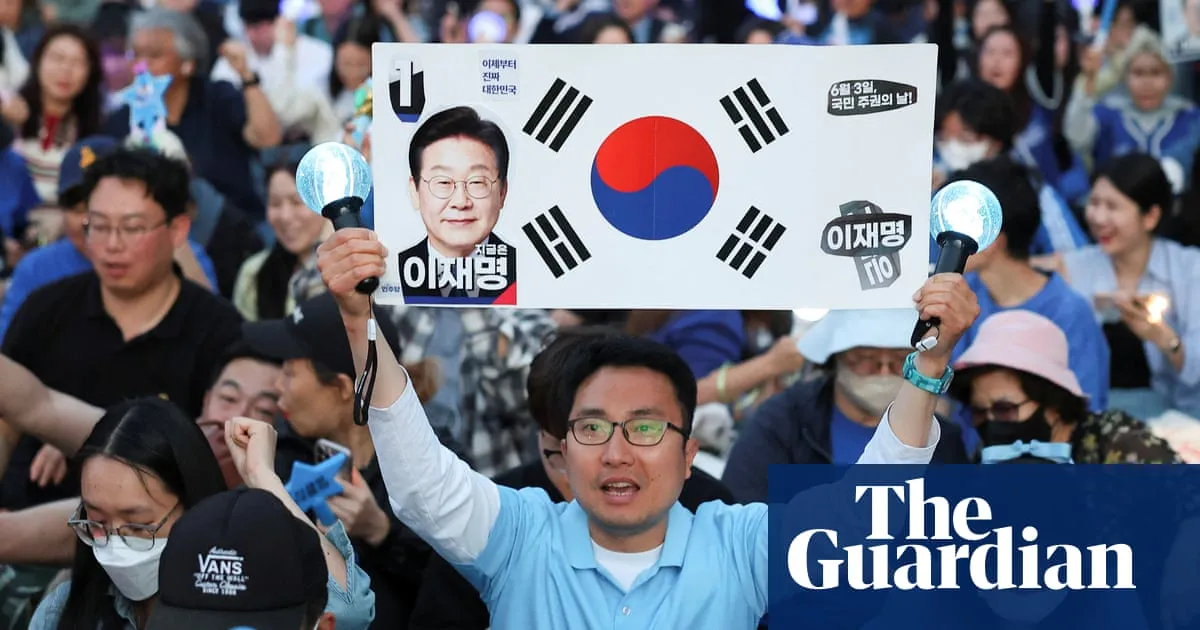
In a historic turn of events, exit polls in South Korea indicate that Lee Jae-myung, the candidate from the Democratic Party, is set to become the country's new president. This snap election was triggered by a brief period of martial law imposed by the now-impeached former leader Yoon Suk Yeol. As the polls closed, Lee referred to the day as “judgment day” for Asia’s fourth-biggest economy.
According to preliminary results from the broadcaster MBN, Lee secured approximately 49.2% of the vote, placing him well ahead of his nearest rival, the conservative Kim Moon-soo, who garnered 41.7%. A joint exit poll conducted by three other broadcasters showed Lee’s support even higher at 51.7%, while Kim received 39.3%. Voter turnout was notably high at 77.8% an hour before the polls closed, surpassing the turnout recorded during the previous presidential election in 2022.
More than a third of the 44.39 million eligible voters participated in early voting earlier in the week, highlighting the electorate's engagement in this pivotal moment. The official results are anticipated to be declared several hours after polls closed at 8 PM local time (midday BST), likely before midnight.
This election follows a significant political crisis in South Korea, marked by Yoon’s controversial declaration of martial law in early December, which was overturned within hours. The crisis has contributed to rising public discontent, particularly as the country grapples with an economic downturn, increasing income inequality, and uncertainties surrounding the US's commitment to South Korea's security under the Trump administration.
Lee, a 61-year-old former human rights lawyer, has positioned himself as a voice of change, capitalizing on public outrage against Yoon’s leadership. He emphasized the election as an opportunity for voters to “save South Korea, which is in crisis due to the greed of the establishment.” However, the divisions created during Yoon's presidency are likely to pose challenges for Lee as he embarks on his single five-year term, which begins without the customary two-month transition period.
As Lee prepares to take office, he faces a multitude of challenges, including a slowing economy, the ongoing trade war initiated by Trump, and the persistent nuclear threat from North Korea. In his final campaign speeches, Lee committed to revitalizing the economy, reducing inequality, and easing national divisions. He cautioned that a victory for Kim would signify a return to Yoon’s “rebellion forces,” which he claims could jeopardize democracy and human rights in South Korea.
Conversely, Kim, a former labour minister under Yoon, has raised concerns that a victorious Lee could misuse his powers to retaliate against political adversaries and leverage his party's majority in the National Assembly to shield himself from ongoing legal challenges. Kim alleged that Lee is attempting to consolidate power and establish a dictatorship reminiscent of historical tyrants.
Lee, who spearheaded the movement to oust Yoon, is a polarizing figure in South Korean politics, currently facing multiple criminal trials related to bribery and a property development scandal. Courts have agreed to postpone further hearings until after the election, allowing him to continue his presidential campaign amid these unresolved legal issues. Lee has consistently denied the charges, labeling them as politically motivated attacks.
Despite his reputation as a radical reformer, Lee has adopted a more cautious approach in recent speeches, promising pragmatism in foreign relations. He has pledged to uphold South Korea's alliance with the United States and maintain cooperation with Japan, while expressing a desire to shift away from Yoon’s confrontational policies towards North Korea. Nonetheless, he acknowledged the challenges in quickly resuming diplomatic engagements with North Korean leader Kim Jong-un.
As South Korea anticipates the official election results, the country stands at a crossroads, with Lee Jae-myung poised to lead amid a landscape marked by division, economic challenges, and the specter of political instability.